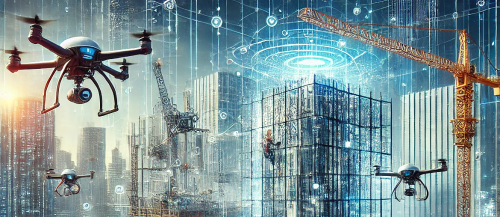Introduction
Artificial Intelligence (AI) is rapidly transforming industries, and the construction sector is no exception. With advancements in AI and machine learning technology, the construction industry is witnessing a significant shift towards increased efficiency, safety, and productivity. This article explores the various ways construction companies are using AI and integrating it into their processes, as well as its wider impact on the industry.
The State of AI in Construction
IFS (Industrial and Financial Systems) has released the results of a recent survey conducted among senior leaders in the construction industry. The survey focused on the role of AI, although the full report was not available at the time of writing and might provide further details.
The potential impact of AI on the construction industry is significant, with 76% of senior decision-makers in large construction and engineering firms in the UK expressing high expectations for its benefits.
With these high expectations come anticipated benefits. According to the research:
· 31% of respondents indicated that executives and boards see significant value in enhancing market knowledge.
· 29% believe AI will drive product or service innovation.
· 29% expect AI to contribute to consistent business growth.
It is worth noting that there is no evidence that IFS conducted a qualitative survey to detail exactly how respondents foresee AI powering business growth. However, analyst firm GMI is predicting that between 2023 and 2032, AI in the construction market will grow at a CAGR of 20% to more than $15.1 billion. Whilst there are still challenges to the future of AI in design and construction firms, AI has the potential to help almost every aspect of the industry.
Enhancing Project Management and Planning
AI-driven project management tools are revolutionising the way construction projects are planned and executed. Construction managers are leveraging AI systems and tools to constantly improve their project management processes. These tools utilise machine learning algorithms to analyse vast amounts of data, helping project managers on construction sites make better-informed decisions. AI can be used to predict project timelines, help to identify potential risks, and optimise resource allocation. AI helps to ensure that projects stay on track and within budget.
Benefits of AI in Project Management
- Accurate Predictions: AI models can forecast project completion dates and budget requirements with high precision.
- Risk Mitigation: By analysing historical data, AI can identify potential risks and suggest preventive measures.
- Resource Optimisation: AI algorithms optimise the allocation of resources, ensuring that labour, materials, and equipment are used efficiently.
Improving Safety Standards
Safety is a paramount concern in the industry, especially for construction workers. The use of AI-powered safety systems is enhancing on-site safety by monitoring real-time data and predicting potential hazards. These systems use computer vision and 'Internet of Things' (IoT) devices to monitor building information, detect unsafe practices, and alert workers and supervisors immediately.
Key Safety Applications of AI
- Hazard Detection: AI systems can identify hazards such as falling objects, machinery malfunctions, and unsafe worker behaviours.
- Predictive Maintenance: Using building information modelling, the AI can predict when equipment is likely to fail, allowing for timely maintenance and reducing the risk of accidents.
- Wearable Technology: AI-integrated wearable devices monitor workers' health metrics and environmental conditions, ensuring their well-being.
Streamlining Construction Processes
Artificial Intelligence is now automating several construction processes, leading to faster project completion and reduced costs. Robotics and AI-powered machinery are being employed for tasks such as bricklaying, concrete pouring, and site inspections.
Examples of AI in Construction Automation
- Robotic Bricklaying: AI-driven robots can lay bricks with precision and speed, significantly reducing construction time.
- Automated Concrete Pouring: AI systems control concrete mixers and pourers, ensuring consistency and quality in construction.
- Drone Inspections: AI-powered drones conduct site inspections, capturing detailed images and identifying issues that need attention.
Enhancing Design and Architecture
AI is also transforming architectural design by enabling the creation of innovative and efficient structures. AI-driven design software can generate multiple design options based on specific criteria, allowing architects to explore creative solutions.
Impact of AI on Design
- Generative Design: AI algorithms can create numerous design alternatives, optimising for factors such as cost, aesthetics, and structural integrity.
- Sustainability: AI can help in designing sustainable buildings by analysing energy consumption patterns and suggesting eco-friendly materials.
- Virtual Reality (VR) Integration: AI and VR technologies combine to provide immersive design experiences, allowing stakeholders to visualise projects before construction begins.
Conclusion
AI is undeniably transforming the construction industry by enhancing project management, improving safety, streamlining processes, and revolutionising design. As AI technology continues to evolve, its integration into engineering and construction will lead to even greater efficiencies and innovations. Embracing AI in construction not only improves productivity but also ensures safer and more sustainable building practices. AI is already making an impact in the design, management, engineering, and construction industries, and it is likely that many construction projects will soon benefit from AI, or even be powered by AI systems and technologies.
As the construction industry sees the rise of AI, we are here, ready to supply the necessary materials and support to help your construction projects! Please feel free to browse our building materials range on our website today, or for more information,
contact us on 03330 117818 or email info@bsfixings.co.uk and we will be happy to help.






